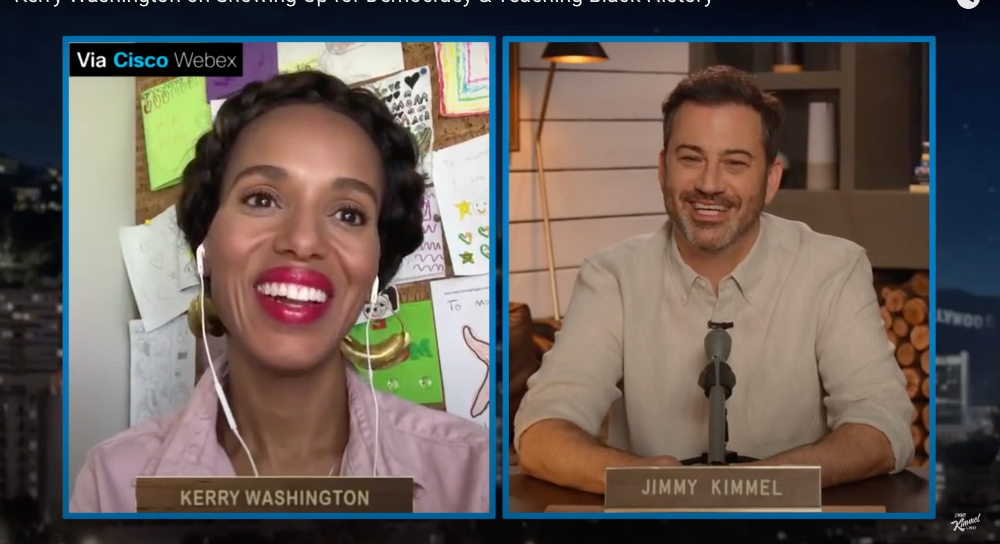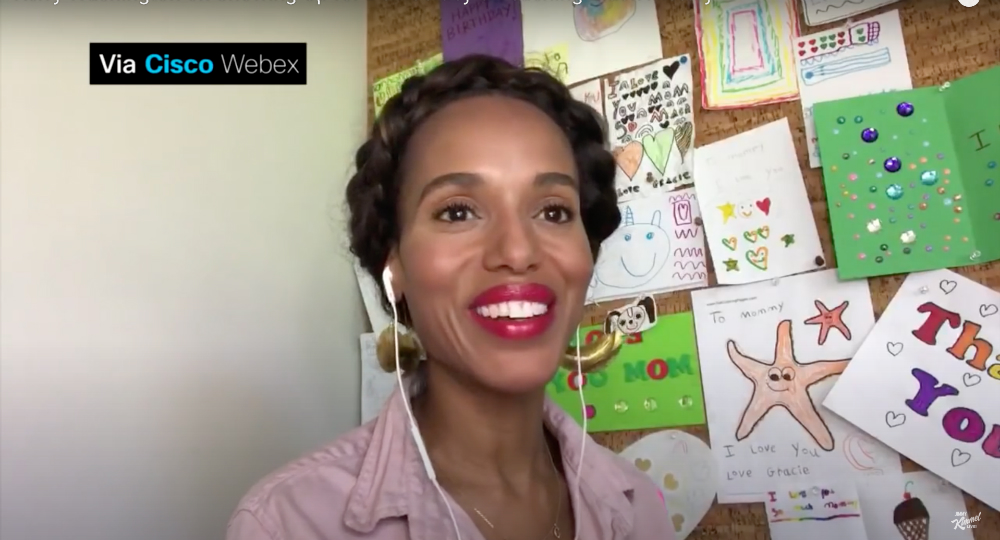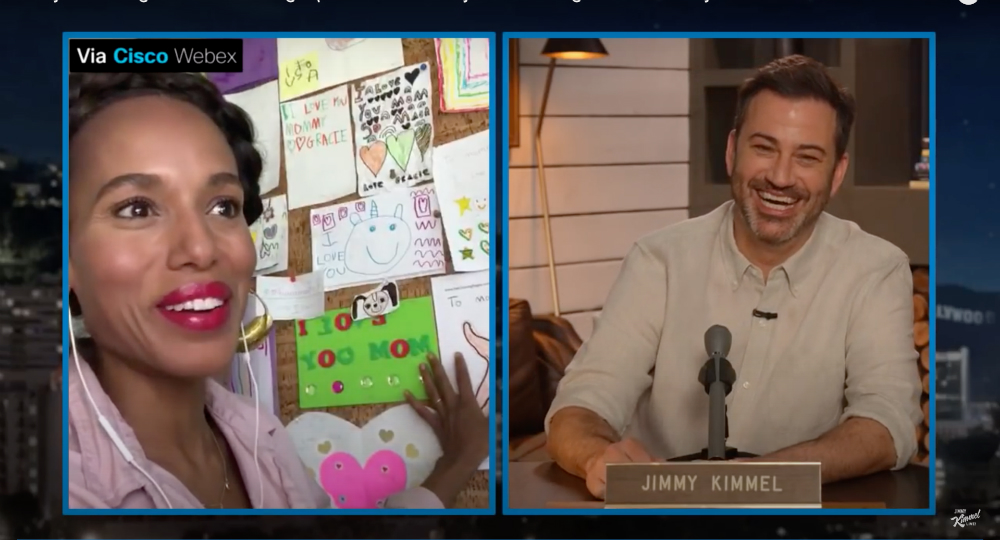Kerry Washington appeared on Jimmy Kimmel Live at Home to promote Little Fires Everywhere, on Hulu, and American Son, the play she took from stage to film that has come back into the spotlight since it deals with racial inequality at the hands of the police. American Son is currently on Netflix. Kerry spoke to Jimmy about how she’s sees the BLM protests as well as what she’d like to see for the future. Kerry said she’s been focusing a lot on education, specifically expanding the Black History, focusing on what came before slavery, reconstruction and Jim Crow . I’ve posted the clip below but I’m using Jezebel’s transcription because Maria Sherman has graciously already done the work.
There’s a lot of posts about [how] privilege looks like discovering that racism exists as opposed to knowing that it exists. So I think for a lot of black families, we don’t have the privilege of ignoring what’s going on and pretending that it’s not happening. But the thing I’ve been thinking about a lot, honestly, with my kids, I’ve been thinking—and with my friends’ kids—I’ve been thinking a lot about education and a lot about talking about race and introducing ideas of race and really thinking about the idea that for a lot of kids—kids are introduced to race at Black History Month or in the concept of change-makers like Martin Luther King Jr. and Rosa Parks.
And I think it’s really important that we start to introduce the idea of race with a black history that begins before teaching kids what black people were told they couldn’t do, right? So there’s Maasai Warriors and the kingdoms of Ghana and Queen Nefertiti and the pyramids of Egypt. Alicia Keys talks about this a little bit in her new memoir that’s so beautiful, More Myself, but this idea of teaching kids that black history and black people were a lot of things before segregation and Jim Crow and the Civil Rights Movement. So that we understand the beautiful complexity and elegance and richness of black history before not, you know, refusing to be put in the back of the bus.
[From Jimmy Kimmel Live via Jezebel]
The National Civil Rights Museum in Memphis, Tennessee emphasizes Black History prior to Civil Rights in its entrance. Although their timeline begins with those who were brought here under slavery, the message sounds something like what Kerry is talking about, that the foundation of Black survival in an unjust society was laid by leaders and warriors who never ceased being either.
At the 2:10 minute mark in the clip below, Kerry touched on something that I’ve been thinking about as well. Jimmy asked Kerry if the amount of people marching across the country surprised her and Kerry responded, “It doesn’t surprise me. It fills me with so much hope and encouragement.” I spend most of my time sickened or on the verge of tears, forcing myself not to scroll past all the awful imagery of continued police abuse and the accounts of their victims. And yet, there is this sliver of hope that stirs in me. As Kerry mentioned it feels like, finally, the cracks are becoming fissures which might just lead to real change. People will finally demand a move forward and not settle back on old, unfair ways. I worried I was just viewing things through rose-colored glasses, but if Kerry is hopeful too, maybe it’s okay to feel slightly optimistic.
Photo credit: YouTube and WENN/Avalon



















I very much agree with this statement. I come from immigrant parents who came here in ‘69. While I was born here and eventually raised in the south, I was quite unaware of the history which no one talked about or educated us on. I am a history major and in college I took the history of the Civil Rights and it was an eye opener. The terrible treatment of the black community and I remember educating my parents as well. Then I read Incidents in the Life of a Slave Girl. Wow. And eye opener to what many refuse to accept. The history needs to be taught or it will be forgotten.
That is so wild to me. I remember meeting a (clearly very privileged) American while travelling and trying to explain where I was from in Canada but we couldn’t accomplish it because she didn’t know where Washington or Montana was… in her own country… Like what… 0% chance she knew then or now what the Middle Passage was. But she probably could have talked about dumping some tea in a harbour or why France sent America a giant statue of a lady in a robe for days lol.
Please do not judge all Americans by the privileged and ignorant that are unfortunately out there.
Growing up in Virginia, African American history wasn’t taught. It was the Civil war and antebellum south that I recall they drilled on and on about. Which, being born up north, I would say: you guys lost. Who cares about how you committed treason. That didn’t go over so well.
That ignorance is intentional. They purposefully sanitize the history they teach in a lot of American schools (many of which are underfunded, at that) so people don’t understand the depths of the social injustices inherent to this country’s design. It’s a highly Eurocentric take that undermines the pre-colonial history of both the American indigenous peoples and the Africans taken into bondage for agricultural slavery. They also don’t teach you about Asia because they don’t want to talk about the colonial influence on India and China, the truth of the complexity of America’s involvement in the communist wars, or our own hand in the development of radicalized groups in the Middle East. They don’t teach you about South America because that would mean highlighting how many of the banana republics down there were put in place by American CIA operations in an attempt to combat sociocommunist trends. It’s easy to promote and maintain white supremacy when Americans (and particularly *white* Americans) are ignorant to the realities of the evil that’s been committed on their own soil and against other nations to promote its imperialist power.
I was privileged to attend a good public schools both in my childhood and teen years, but there were some major things even I didn’t get to see until college. When you consider that not everybody has the privilege of attending higher institutions of learning or having access to those kinds of materials, it’s easy to understand how they maintain such a limited scope and understanding of the world around them. The American government wants us to be ethnocentric. It wants Americans to buy into the superficial glamour and never question how what’s underneath could improve.
That’s so crazy to me! (No shade on you, shade is to the US education system) I live in New Zealand and one of our Social Studies units in Year 10 (when we were 15) was the Black Civil Rights Movement in the USA… not even our own country (similarly we studied the Irish Troubles in Year 11 (which always pleasantly surprises my Irish friends)
Social Studies really is such an important subject, esp as it helps with learning empathy for others
Absolutely agree with her. It’s tragic that schools don’t cover African history.
On a related note, I went to a cosmetology school and black hair techniques were barely taught. We definitely wanted to learn, and it was brought up to the school’s management, but nothing really changed. It’s just another example of how black culture is forgotten and abused.
She’s right. Black history goes back thousands of years. And yet all that is taught – to black and white people is what happened from slavery onward. Africa and the origins of its people is so rich and full and amazing. And it’s sad that black kids are denied knowing about this. But that’s the entire point of it. To deny people the knowledge of their history.
Honestly, we’re “lucky” if we’re taught about slavery. I remember watching Amistad, and I remember learning about the Civil War (and I’m pretty sure I was taught “it was about states rights”) and I remember learning about Rosa Parks and MLK in a very whitewashed fashion.
Everything else I know I learned about in college or from additional reading etc, and it’s still embarrassing at how little I know about the history of Africa, the different countries and cultures, colonialization, etc.
Also, it seems to me to limit Black history by showing only that which is in some way defined or backgrounded by White history.
It’s wild, I just looked up “African history books” on google to see what I could find at my city’s online library. ONE of the 30-40 I entered was even in there (a bestseller on king Leopold), and this is a very well stocked library. I love ancient and early history and would love to read some books about Africa. Does anyone have any suggestions?
I grew up in California and we learned not only about black history in depth, but we spent years learning about native Americans, their language and culture, what colonists did to them, and what reservations are like.
My husband and friends who grew up in the Midwest? Nope. They didn’t learn half of what I did. My husband grew up in Missouri and his entire family never learned about the civil war!! It’s upsetting to me that the people who preach “but it’s our history we have to educate the children!!” About those ugly racist statues aren’t actually doing any educating at all.
I was just going to say I taught in California and we taught the history of many ancient African civilizations in middle school, also ancient central and south American cultures. We went over the religion, technologies, leaders and languages. We also cover Japanese internment.
Yes, very much agree with this. I’ve been incorporating black and world history into the curriculum and it makes such a difference in the classroom. When you get to the point at which white supremacist thinking is deployed to justify slavery and colonialism the students just have a deeper understanding of what that does to the world. I also put black people into European history as it’s nonsense to act as if the past of Europe was white until a few decades ago. One of the wealthiest families of Roman York was a black family.
So so true! Most of what I’ve learned, I learned outside of school (via my parents) and once I became an adult.Our history has been watered down so much to appease ppl who would really like to pretend none of it ever happened.
Yes, definitely. When I went to high school (in a liberal East coast state), we took us history then world history. In us history, coverage of African Americans was just as you say- starting from slavery and civil rights era. Then world history was extremely Eurocentric- mostly Europe, the world wars. Very very little Asian, African, Latin American history. And it was taught from a colonial point of view- who governed what. I realize its a lot of ground to cover but what is more relevant the world kids live in today? King white guy the tenth or the political history of Asia ? Maybe different perspectives on colonialism would be helpful, at a bare minimum! I hope it has gotten better since I was in school (the late 90s) but I’m not confident in that. John Leguizamo talks about this from a Latin American perspective in his Latin History for Morons special.
Right, you aren’t going to be able to teach kids everything. But you can teach MORE, or even switch the perspective. Like we learned about all the explorers, and I remember Cortez specifically (but to be honest I was a Spanish major in college so I learned a lot then) but we didn’t really learn about the IMPACT of the explorers – like it was “so and so discovered this place” and then we moved on. Because it was all from the European/American perspective – hence the term “discovered” etc. There has to be a way to broaden the teaching while acknowledging some things aren’t going to get covered.
My son is in second grade and so far the focus has been on learning about America, which I get at this age. I’ll be interested to see how it changes as he gets older.
Same here, NJ, and it was too broad in scope, which makes it limiting.
A friend of mine from HS is an educator in a very white, rural, conservative area, and is currently challenging the higher ups with this idea of changing the curriculum.
It’s a disgrace that black U.S. history is not properly taught and incorporated into the mandatory curriculum across the country. My husband is from Michigan and he didn’t learn anything about Malcolm X at school or his Ivy League education. An entire side of his country’s recent history that he is only starting to learn (in his 40s)…
I 100% agree with her. I don’t know if we can truly understand why black lives haven’t mattered in the past, how widespread systemic racism has been propagated within our institutions, or even the basis of so many of the racist tropes and jokes, without first exploring the historical events and injustice that brought us to this point.
Last night I watched a video responding to racist jokes of an “influencer”, where in the influencer made a joke about Black women screaming in fear when in water and grabbing at wigs, etc. The speaker pointed out that fear of the water is rooted in historical practices, where rebels would be pushed off of slave ships and left to die in the ocean, or drowning was used as a way to further torture and kill others (Emmitt Till). Her point was that we should understand how these “jokes” about people groups come to be, and once you see the utter terror and pain behind those fears, it’s almost impossible for people with a conscience to go on and then joke about it.
The reason that history books don’t cover it is because racist POS control the school board in Texas. They decide what books to buy and since their school system is so huge, it affects how text book makers write their books.
They only way to fix this is to kick out the rascists assholes that run the school boards and buy the textbooks and determine the curriculum that is taught. Teachers have gotten in trouble for trying to teach ‘minority’ topics outside of the white-washed history. Students as well. It’s disgusting.
I agree with her that this information is crucial and needs to be taught, but I’m not going to lie— I was really surprised to find most commenters here saying they only learned about black history from the civil rights movement on. My experience was the opposite of that. I went to school in NYC and northern NJ and we learned about slavery along with the civil war in late elementary school and during middle school. There was some pretty in-depth information about slavery, but not very much about the civil rights movement, which is actually interesting since a lot of my schooling was in Newark, NJ, where some of the most important aspects of the civil rights movement took place in the 60’s. What I learned about the civil rights movement came from my parents/relatives or what I read on my own time.
As a matter of fact, we were even taught about the Confederacy, and learned in school that the confederacy was literally based around slavery… which is why it boils my blood to see that flag anywhere today or hear anyone try to tell me it stands for more than slavery.
I know that not everyone is religious, and I know that not everyone who is religious is Christian, but I’m a Christian, and I couldn’t help but think of this when I saw this.
It pains me to see how segregated people of my faith are along racial lines, especially in the U.S. One thing I always emphasize with people in Bible study (that’s a huge part of what I do in real life) is that the church to whom we owe the most for the preservation and perpetuation of our scripture over the last 2,000 years is the church of Ancient Cush (Ethiopia). Coptic Christians and Egyptian Christians–almost all of whom were/are black Christians–have been the ones for literally millennia to preserve the most foundational and fundamental pieces of our faith, and yet American Christians typically know nothing of that history.
Christianity has been abused in the USA to exclude and subjugate and silence people of color–and particularly black people of color, and that is both shameful and painfully ironic. Christianity is not historically a religion of white, Anglo-Saxons. It was a religion of the Near East and Northern Africa long before it was picked up by the Romans and Byzantines. It is a religion that was kept and fostered and preserved by Africans…for the entire world. To ME, as a Christian, that is a precious gift that I owe to those people groups and that part of the world.
I loved hearing Kerry’s words here about the importance of history as more than a story of fighting against oppression–as a story of what a people accomplished and created on its own BEFORE the oppression came. It brought this part of my own life’s priorities to mind. My faith is a huge part of my life, and black people throughout history have had a massive, crucial and undeniably authoritative hand in the preservation of my faith. I’d like to see more Christians learn this about their own church, and I want black Christians to know it and feel it and see non-black brothers and sisters in the faith care about that history and value it, too.
Kerry is absolutely correct, I learned more about slavery from my American Girl doll than I ever did in the classroom. My parents were supportive of this and bought me more books on Black history, I remember being so horrified by the fugitive slave act and many other atrocities. But in school it was all, “yeah slavery was bad, but MLK came along and fixed racism! And now everything is fine!”
Canadian here. I’m shocked to read in so many of these comments that some Americans weren’t taught about slavery. This is baffling to me. We learn it up here in our Social Studies and History classes as part of the regular curriculum. I remember listening to MLK’s “I Have a Dream” speech in elementary school. And we read novels about the Underground Railroad. We were taught about the awful conditions on the boats and about slave markets. Heck, we’re taught about Apartheid in South Africa, Japanese internment camps in Canada, the Irish famine, British colonialism over India–the list goes on. Is this stuff really not taught in American schools? Just totally astounded by this.
Yes, it is, dotwood.
I’m shocked to hear fellow Americans saying that they weren’t taught exhaustively through the Civil War and slavery from colonial times onward. I was taught exhaustively through that period through my education, and so was my daughter.
I think there are pockets in the US with insufficient history modules/curricula, but Colonial slavery, Antebellum slavery, Reconstruction rebound and achievement followed by oppression and violence, the decades prior to Civil Rights, and the pre-Vietnam Era attempts to re-subjugate black voices and segregate society into racially divided ghettos…I was taught all of that, and I’ve been watching my daughter’s history work for these things, as well.
Black American history is American history, and I think a lot of people just simply didn’t care enough to pay attention in history class. That’s what a majority of this is. The other problematic dynamic is when the student or the teachers choose not to emphasize racially relevant material, even when it’s on the syllabus.
Black American children are not given emphasis/ownership of the affirming history and white American children are not given emphasis/ownership of the shameful and perspective-framing history, and you end up with the mess we’re currently in where people feel tremendous distrust, defensiveness, and disharmony. It has messed with our ability to come together as a nation to unite over things that need to change in various systems. History is a crucial piece of relating to other humans, and I’m glad Kerry brought it up.